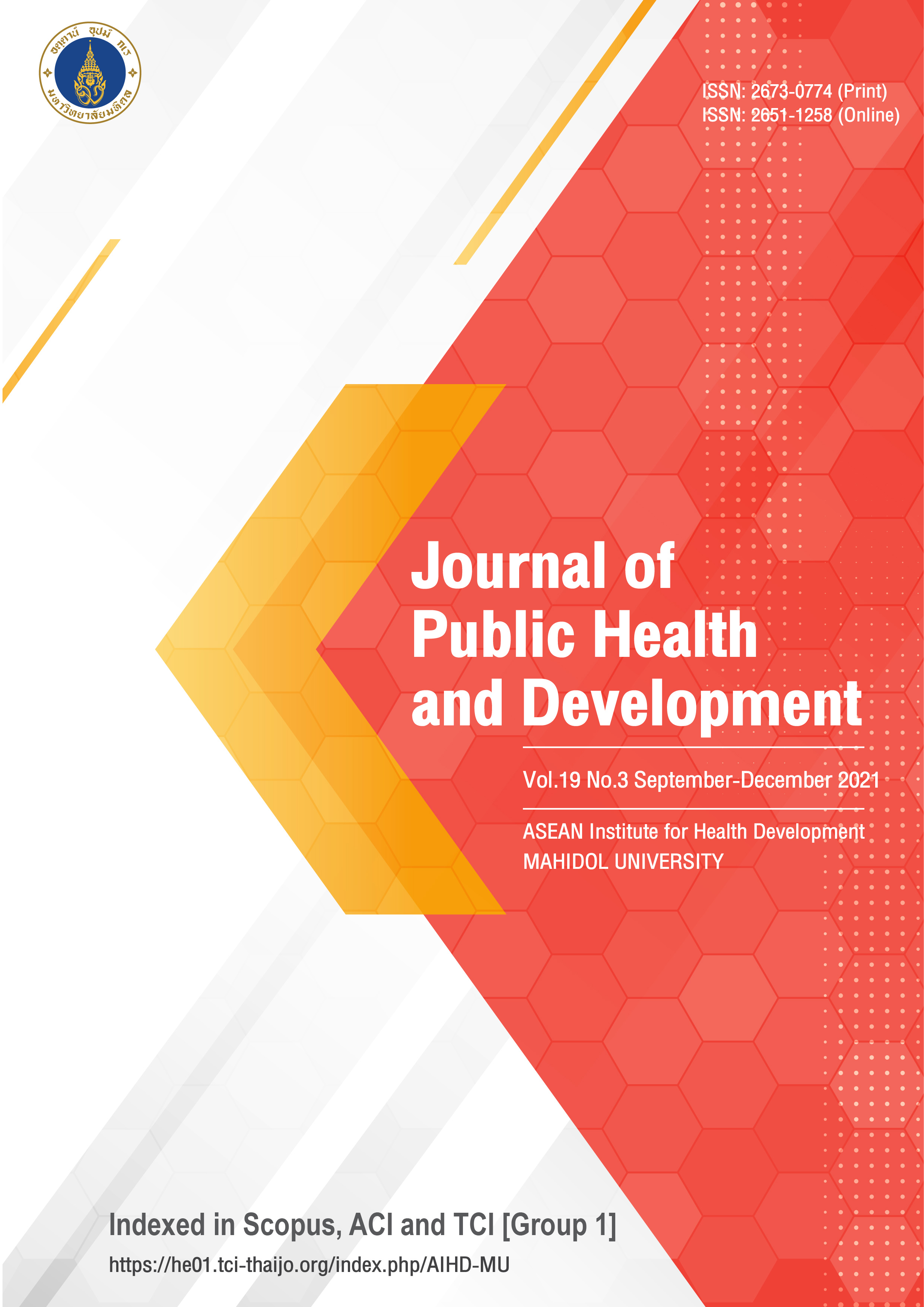Effectiveness of a training model based on intergenerational and participatory learning to enhance health information literacy for the elderly
Main Article Content
Abstract
This study aimed to determine the effectiveness of a participatory training programme to enhance health information literacy among the elderly. The study consisted of three phases; development of training model, development of training programme, and evaluation of the programme. There were four stages of the training model; stimulation, sharing, collaboration, and crystallisation.
The training programme was created through participatory learning to enhance health information. A total of 30 elderly was recruited to evaluate the effectiveness of the programme. The measurement of the study included access to health information, understanding and reliability of health information, and communication of correct information. Paired t-test was performed to examine the effectiveness of the programme. There were statistically significant differences in all measurement sections between pretest and posttest scores (p-value <.001). Higher mean scores were shown in the posttest for access to health information, understanding and reliability of health information, and communication of correct information (8.50, 7.40, and 8.20 respectively). The participatory learning programme was effective for enhancing health literacy. Stakeholders could apply the programme for enhancing health information literacy.
Article Details

This work is licensed under a Creative Commons Attribution-NonCommercial-NoDerivatives 4.0 International License.
References
Foundation of Thai Gerontology Research and Development institute. Thai elderly Situation 2015. Bangkok. 2016. (in Thai).
National Statistical Office. Report on the 2017 survey of the older persons in Thailand. 2018. (in Thai).
Suwich Tirakoat, Weerapong Polnigongit. Internet usage behaviors, literacy, and attitude towards utilization of wellness content on the internet among Thai elderly. Journal of Nursing and Health Care 2018; 36(1):72-80. (in Thai).
Eriksson-Backa K, Ek S, Niemelä R, Huotari M-L. Health information literacy in everyday life: A study of Finns aged 65-79 years. Health informatics journal. 2012;18:83-94.
JaiBoon K. Senior using social media Hedge Avoid criminals Bangkok: Post Today [Internet]. 2019 [Cited 2019 August 16]. Available from: https://www.posttoday.com/life/ healthy/551718
Brashier NM, Schacter DL. Aging in an Era of Fake News. Curr Dir Psychol Sci. 2020;29(3):316-23.
Pimjai Tayati CD, Rittichai Onming. The Model of Thai Elderly Learning Management for Information and Communication Technology Literacy. Veridian E-Journal,Silpakorn University. 2017;10(3):1456-71. (in Thai).
Kirana Somwassan, The study of communication behaviour in Line Application data sharing of elderly people. National Conference 2016: Graduate School of Communication Arts and Management Innovation, NIDA, Bangkok: Graduate School of Communication Arts and Management Innovation. NIDA. 2016. (in Thai).
Archanya Ratana-Ubol. Proposal for Operational Improvement Regarding Senior Citizen’s Potential Enhancement. Silpakorn Education Research Journal 2019.;11(1). (in Thai).
Danai Monthatipkul, Wawta Techataweewan, Ujsara Prasertsin. Needs Assessment for Competency Development of Using Information and Communication Technology for Learning of Elderly People in Bangkok. 2018. (in Thai).
Dickinson A, Eisma R, Gregor P, Syme A, Milne S. Strategies for teaching older people to use the World Wide Web. Universal Access in the Information Society. 2005;4:3-15.
Gall M. Intergenerational Learning between Teenagers and Seniors with the Help of Computers. Procedia - Social and Behavioral Sciences. 2014;116.
Polit, D. F., Hungler, B. P. Nursing Research: Principles and Methods. Lippincott Williams and Wilkins, Philadelphia.1999
Luecha Y., Lerdmaleewong M., Laohachinda Y., Leisuwan W., Putwatana P., Thanaruk, R. Nursing Research. Bangkok: Siam Art Printing Co., Ltd. 2000
Knowles M.S. Andragogy in Action. San Franciso: Jossey-Bass. 1984.
Imel S. Using adult learning principles in adult basic and literacy education, Education Practice Application Brief 1998 [Internet]. 1998 [Cited 2019 August 16]. Available from: http://www.scirp.org/ (S(czeh2tfqyw2orz553k1w0r45))/reference/ReferencesPapers.aspx?ReferenceID=355811
Phelan EA, Anderson LA, LaCroix AZ, Larson EB. Older adults' views of "successful aging"--how do they compare with researchers' definitions? J Am Geriatr Soc. 2004;52(2):211-216.
Bressler HaA. Connecting Generations, Strengthening Communities. a Toolkit for Intergenerational Program Planners. Philadelphia. PA: Center for Intergenerational Learning. 2005.
DrPh R, DrPh R, PhD L. An Intergenerational Approach to Informal Science Learning and Relationship Building. Journal of Intergenerational Relationships 2007;5:27-43.
Newman S. Intergenerational Learning and the Contributions of Older People. AGEING HORIZONS. 2008(8): 31-39
Beck, Dennis and Claretha Hughes. "Engaging Adult Learners with Innovative Technologies." Adult and Continuing Education: Concepts, Methodologies, Tools, and Applications, edited by Information Resources Management Association, IGI Global, 2014, pp. 296-311. doi:10.4018/978-1-4666-5780-9.ch017
Sutheera Buathong, Suttipong Sapap-ud, Sirina Jitcharat. Ageing Related to Reason Method and Needs of Learning. Journal of Education Silpakorn University 2015; 12(1,2): 6-17
Kidd JR. How Adults Learn. New York Association Press.1973.
Blank WE. Handbook for developing competency based training programs. Englewood Cliffs: N. J.: Prentice Hall. 1982.
Blanchard PN, and J.W. Thacker. Effective Training: Systems, Strategies, and Practices. Englewood Cliffs: Prentice Hall. 2003.
Sink DL. Design Models and Learning Theories for Adults. 2014.
Diego US. How to Design Training 2015[Internet]. Available from: http:// blink.ucsd.edu/HR/training/instructor/tools/training.html#.
UNESCO. Global Media and Information Literacy Assessment Framework: country readiness and competencies. France. 2013.
Bawden D. Information and digital literacies: a review of concepts. Journal of Documentation 2001;57:218-59.
Office of National Digital Economy and Society Commission . Digital Literacy for Thai citizens. Bangkok. 2018. (in Thai)
Office of National Digital Economy and Society Commission. Media and information literacy summary survey report Thailand 2019. Bangkok. 2019. (in Thai)
UNESCO. Media and information literacy curriculum for teachers. 2011
Kaiwan Y. Traing Program Research and Development. Bangkok: Chulalongkorn University Press. 2016.
Susana Villas-Boas AO, Natália Ramos The Intergenerational Educational Programs: A new Sphere of Lifelong Education. ESREA Network on Between Global and Local: Adult Learning and Development. 2014.
Yuxiang Zhao, Yutian Shi, Qinghua Zhu, editors. Leveraging Social Media to facilities intergeneration learning: Bridging Digital Immigrants with digital natives. iConference2017. 2017.
Netiya Jaemtim and Sineeporn Yuenyong. The Used of Online Media and Perceptions of eHealth Literacy Among the Elderly in Suphanburi Province. The Journal of Baromarajonani College of Nusing 2019; 25(2): 169-180. (in Thai).
Smarn Loipha. The Elderly and Information Technology. Journal of Information Science 2011;29(2):53-64 (in Thai).


